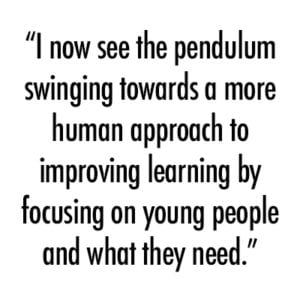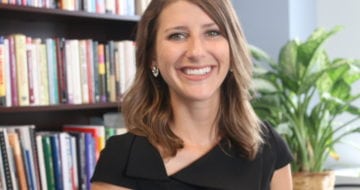I’ve worked in education policy long enough to have seen many pendulum swings. We are seeing a big pendulum swing now, as we pull back from the era of No Child Left Behind and what I would call the technocratic approach to education reform.
Over the past dozen years or so, we’ve been focused on an education reform agenda that, to me, has seemed dehumanized in many ways. The reform agenda has focused on technical things like building and using better standards, better tests, better accountability systems, more evaluations, and better data. These are all incredibly important and needed pieces of the educational enterprise, I don’t dispute that, but it feels like the work has been done in a vacuum, often devoid of connection to the students that should be our focus.
I now see the pendulum swinging towards a more human approach to improving learning by focusing on young people and what they need. I’ve been pleasantly surprised over the past year or so by the increase in articles, events, and initiatives that focus on student-centered learning, social and emotional skills, and even positive youth development.
 AYPF has long advocated for a positive youth development approach to working with young people. We have always believed that while testing, standards, and rich curriculum are all important elements of a high quality school system, what happens outside of the classroom matters just as much. Our founding philosophy is to promote a holistic and comprehensive approach to working with young people that addresses not only their academic needs, but also the need for supportive and caring adults in their lives, for clear boundaries and expectations, to be empowered to speak and act, to engage in age-appropriate activities to test and try new skills, and to develop positive values, social competencies, and a sense of purpose and identity. In other words, to develop into the kinds of people we want as friends, co-workers, and neighbors.
AYPF has long advocated for a positive youth development approach to working with young people. We have always believed that while testing, standards, and rich curriculum are all important elements of a high quality school system, what happens outside of the classroom matters just as much. Our founding philosophy is to promote a holistic and comprehensive approach to working with young people that addresses not only their academic needs, but also the need for supportive and caring adults in their lives, for clear boundaries and expectations, to be empowered to speak and act, to engage in age-appropriate activities to test and try new skills, and to develop positive values, social competencies, and a sense of purpose and identity. In other words, to develop into the kinds of people we want as friends, co-workers, and neighbors.
The Every Student Succeeds Act (ESSA) helps advance this agenda by focusing on a well-rounded education. The new law requires school districts to use some of their funds to support counseling, music, arts, foreign languages, college and career readiness, as well as mental health services, nutrition, physical education, and bullying prevention. This is a positive change, and I know many schools are excited about the flexibility they will have to better serve their students. The 21st Century Community Learning Centers program is another source of funds that promotes a blending of the in-school and out-of-school worlds, allowing youth to develop agency, learn about careers, participate in service learning, and sometimes engage in work experiences. These afterschool programs also promote the development of social and emotional skills, now viewed as a critical element to student success.
The trend toward student-centered learning is also very positive. Schools, districts, and communities are using various strategies to focus on individual needs of children and youth. The increasingly common use of Individualized Learning Plans is one way to determine the needs and interests of youth and ensure that their instructional program meets them. Competency-based, mastery-based, or performance-based education, which is also becoming more frequently used, allows students to advance once they know the material, freeing them from a time-based system; provides timely, differentiated supports based on where the learner is starting; and uses multiple assessments that allow for personal expression and demonstration of measurable and transferable knowledge and skills.
All students can benefit from personalized learning, but certain groups of young people are in great need of that approach. Youth who are low income, in the foster care system, homeless, or involved with the court system need many individualized supports and services to help transition to an independent adulthood. More and more, schools, communities, and a host of social and health programs are realizing they need to work together to provide a comprehensive array of services and supports to these populations (e.g. housing, food, transportation, child care, mentoring, health services). ESSA fortunately increases the focus on serving these populations and encourages schools to work with other providers to ensure the provision of supports. In addition, we are learning from high quality research (here and here) how important it is for an at-risk youth to be connected to a caring adult who helps them over a sustained period of time to navigate the challenges in accessing multiple services and transitioning to adulthood.
Lastly, the pendulum is swinging back to an acceptance that career-focused education and work experiences are critical for success. Not only does career-focused learning help students apply and connect their knowledge to real problem-solving, it gives students a chance to experience the world of work and various careers, to develop employer-desired skills, and often to engage in learning about a subject or career that aligns with the student’s passion.
I am happy that this swing is taking place. AYPF has long pushed for these approaches to serving youth, and we are happy to see that more and more of our colleagues are seeing the value in them as well. I hope we can all continue to keep the pendulum swinging in this direction.
Best in 2017!






